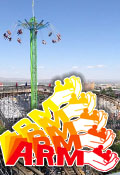Ensuring effective hand sanitizing at amusement parks
By News Release | July 22, 2020
As amusement, theme and water parks prepare to reopen during the COVID-19 pandemic, health and safety considerations have never been more critical. While the importance of preventative measures such as hand sanitizing are generally well-understood, one of the key challenges for amusement parks is making it easy for employees and the public to prevent the spread of the coronavirus. Many parks are now installing hand sanitizer stations as part of their COVID-19 response.
A traditional format for dispensing hand sanitizer in public places is through a freestanding, countertop or wall-mounted station placed in high-traffic areas such as the store entrance and counters. However, it is common for amusement parks to run out of sanitizer quickly when utilizing a small dispenser container. This creates a replenishment issue for employees that are usually busy attending to customers and other important tasks.
More importantly, the risk with empty stations is that employees and the public will miss opportunities to sanitize their hands, increasing the opportunity to spread the virus through contact with others. As high-density, crowded environments are most susceptible to the disease spreading, amusement parks require a solution that is more tailored to their needs.
“The design of commercial hand sanitizing stations has two key weaknesses,” according to Kevin McGrath, Business Unit Manager of Union NJ-based manufacturing company, whose company Creative Serving Inc. is producing a hand’s free sanitizing station specially for use at amusement parks.
“Many stations dispense relatively small quantities of hand sanitizer before running out which requires frequent replenishment,” explains McGrath. “And if an automated dispenser is used, staff must also regularly replace batteries for the station too. It is nearly impossible to prevent empty stations from occurring.”
With the high density and high traffic demands of an amusement park environment in mind, hand sanitizer stations have recently been purpose-built for retail environments. A key difference is the ability to hold one gallon of sanitizer at a time reducing the frequency of replenishment. The hand sanitizing stations can be freestanding, installed on counter-tops or wall-mounted.
To reduce the need of employees and customers touching the station with their hands, products like the hand’s free sanitizing station dispense product using a plastic pump operated by a foot pedal. This also eliminates the need for replacing batteries or using electricity, which saves parks time and money. Moreover, the freestanding station can be bolted to the floor and is strong enough for daily high-volume use. The station’s durable antimicrobial powder coated steel further reduces the risk of a virus spreading.
The challenge of encouraging the public to use the hand sanitizing station still remains, however.
“There’s some psychology involved when promoting a healthy habit such as regularly sanitizing your hands,” says McGrath. “A station also does need not to be an advertisement for a brand of sanitizer either. If we really want customers and staff to use a station, it needs to be seen as part of the store environment and be built to last over time.”
Creative Serving, for example, addresses the issue by providing foot pedal operated hand sanitizing stations branded to fit in with an amusement park’s identity. Custom graphics such as the park name or logo can be added.
More than just fitting in with the store aesthetically, integrating the brand identity can reinforce that hand sanitizing is a company policy and become another way to show community pride by keeping the facilities as healthy as possible.
Additional information on Creative Serving and their Hand’s Free sanitizing stations can be found on their website at www.creativeserving.com.















